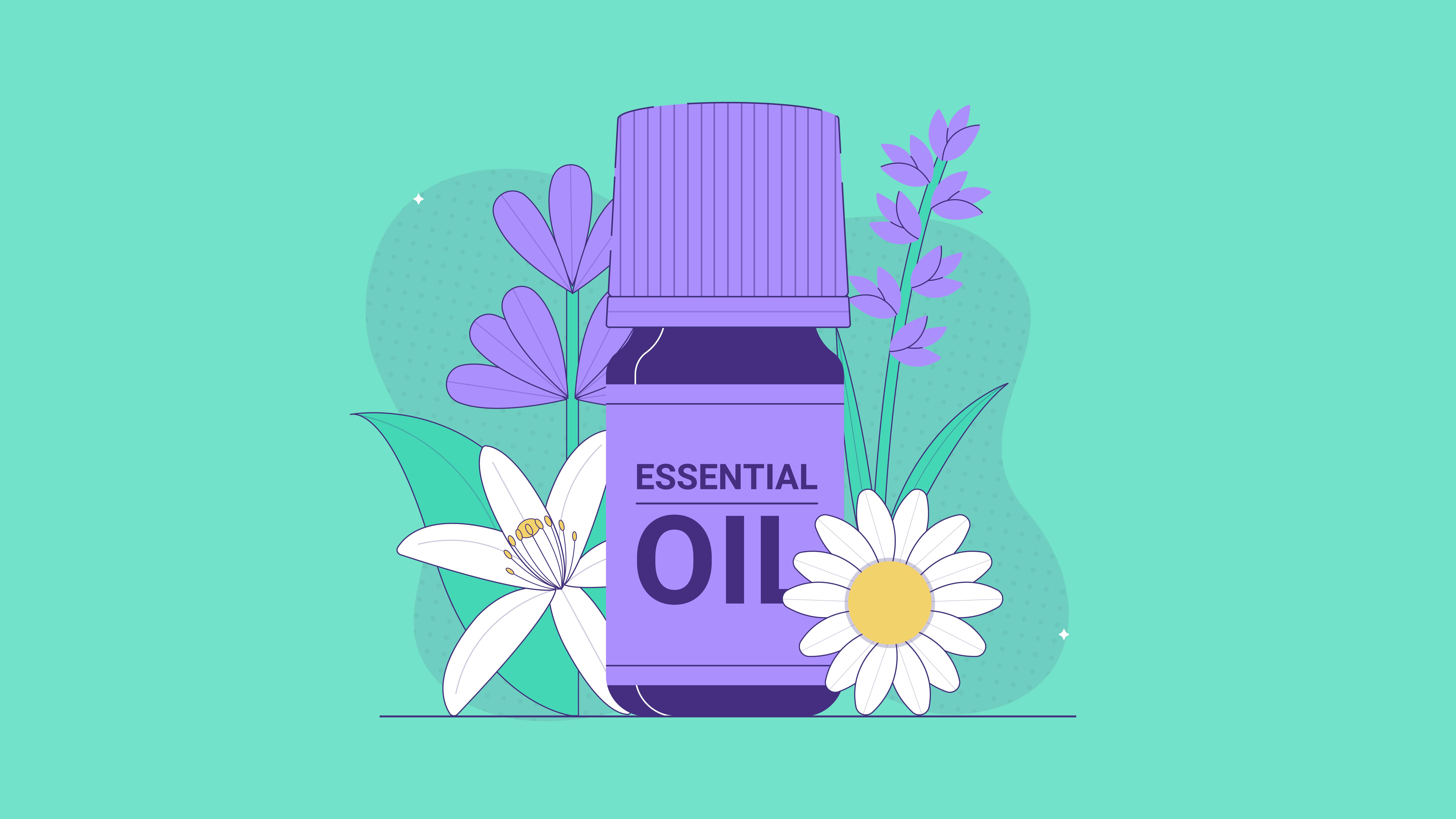
10 Best Essential Oils for Sleep
Preparing for sleep should be a time to unwind from the day’s activities, but when you’re stressed, it can be difficult to fall or stay asleep. If you’re constantly waking up, you’ll feel drowsy the following day and feel even more stressed out.
Incorporating essential oils into your routine is an excellent remedy to help you relax and naturally improve your sleep. Diffusing or topically applying essential oils can calm the nerves, reduce blood pressure, and lower heart rate.
In our article, we review some of the best essential oils for sleep.
Lavender Oil
 Lavender is one of the most popular essential oils and commonly used for relaxation—its sedative properties promote calm and induce sleep. Once inhaled, lavender quiets the brain by interacting with the GABA neurotransmitter. The GABA neurotransmitter regulates anxiety and may be more active in times of stress, but lavender reduces GABA activity and soothes the nervous system. Lavender oil can also reduce insomnia, depression, and anxiety by lowering blood pressure and heart rate.
Lavender is one of the most popular essential oils and commonly used for relaxation—its sedative properties promote calm and induce sleep. Once inhaled, lavender quiets the brain by interacting with the GABA neurotransmitter. The GABA neurotransmitter regulates anxiety and may be more active in times of stress, but lavender reduces GABA activity and soothes the nervous system. Lavender oil can also reduce insomnia, depression, and anxiety by lowering blood pressure and heart rate.
There are over 40 types of lavender plants in the world—the most common is Lavandula angustifolia plant, native to northern Africa and the Meditteranean. The oil is distilled from the flower spikes.
Roman Chamomile Oil
 You may be more familiar with chamomile tea than its essential oil counterpart, but whether you drink herbal tea or diffuse the oil, Roman chamomile can induce sleep. There are two types of chamomile—Roman and German. Roman chamomile is the milder of the two, and perfect for sensitive skin.
You may be more familiar with chamomile tea than its essential oil counterpart, but whether you drink herbal tea or diffuse the oil, Roman chamomile can induce sleep. There are two types of chamomile—Roman and German. Roman chamomile is the milder of the two, and perfect for sensitive skin.
Roman chamomile essential oil has a sweet scent, similar to apples, and acts as a mild tranquilizer. When applied to the bottom of your feet or rubbed on the inside of your wrists, Roman chamomile gets to your bloodstream faster to calm frazzled nerves.
Clary Sage Oil
 Clary sage is a natural sedative and reduces cortisol levels, a stress hormone. Worrying over the day’s events can cause undue stress and increase cortisol production, making you restless. However, inhaling clary sage can inhibit stress levels and calm the nervous system. You can enjoy a good night’s sleep without tossing and turning.
Clary sage is a natural sedative and reduces cortisol levels, a stress hormone. Worrying over the day’s events can cause undue stress and increase cortisol production, making you restless. However, inhaling clary sage can inhibit stress levels and calm the nervous system. You can enjoy a good night’s sleep without tossing and turning.
Ylang-Ylang Oil
 Ylang-ylang essential oil lowers blood pressure and heart rate when inhaled or applied topically. Ylang-ylang’s light, floral scent alleviates anxiety and stress. Plus, the sedative properties can also reduce hypertension. The oil is extracted from flowers of the Cananga tree native to India and parts of the Philippines and Indonesia.
Ylang-ylang essential oil lowers blood pressure and heart rate when inhaled or applied topically. Ylang-ylang’s light, floral scent alleviates anxiety and stress. Plus, the sedative properties can also reduce hypertension. The oil is extracted from flowers of the Cananga tree native to India and parts of the Philippines and Indonesia.
Cedarwood Oil
 Cedarwood essential oil can be emotionally grounding if you’re going through a stressful time. Cedarwood has similar calming properties like lavender, including lowering blood pressure and decreasing heart rate. It also promotes tranquility and feelings of safety.
Cedarwood essential oil can be emotionally grounding if you’re going through a stressful time. Cedarwood has similar calming properties like lavender, including lowering blood pressure and decreasing heart rate. It also promotes tranquility and feelings of safety.
Plus, cedarwood contains cedral–once inhaled, cedral relaxes tense muscles, a feature that may improve recovery.
Bergamot Oil
 Unlike other citrus fruits which keep you alert, oil extracted from bergamot fruit induces sleep.
Unlike other citrus fruits which keep you alert, oil extracted from bergamot fruit induces sleep.
When rubbed into the skin or diffused in the air, bergamot essential oil reduces restlessness. So you may find it easier to fall asleep.
Hawaiian Sandalwood Oil
 Hawaiian sandalwood essential oil is best used through aromatherapy. The rich, woody, and sweet aroma relieves tension and enhances mood, aspects which not only improve sleep quality but can help those with depression.
Hawaiian sandalwood essential oil is best used through aromatherapy. The rich, woody, and sweet aroma relieves tension and enhances mood, aspects which not only improve sleep quality but can help those with depression.
Hawaiian sandalwood oil stands out from other sandalwood oils in that it contains a chemical called santol. Santol is responsible for Hawaiian sandalwood’s mood-uplifting and grounding properties.
Neroli Oil
 Neroli essential oil (or orange blossom as it’s sometimes called) induces sleep by lowering cortisol levels and soothing the autonomic nervous system. Diffusing neroli essential oil can help you breathe easier and lower your heart rate, reducing stress and anxiety, and even relieve muscle pain.
Neroli essential oil (or orange blossom as it’s sometimes called) induces sleep by lowering cortisol levels and soothing the autonomic nervous system. Diffusing neroli essential oil can help you breathe easier and lower your heart rate, reducing stress and anxiety, and even relieve muscle pain.
Adding a few drops of Neroli oil to a warm bath can help you feel its effects quicker than inhaling them, so you can enjoy a calming sensation before bedtime.
Vetiver Oil
 Vetiver essential oil can improve breathing for those who snore or suffer from sleep apnea. Research shows that participants who inhaled vetiver oil through a diffuser experienced deeper breaths and exhibited improved sleeping patterns. Other sleep-inducing properties include reducing restlessness and easing anxiety.
Vetiver essential oil can improve breathing for those who snore or suffer from sleep apnea. Research shows that participants who inhaled vetiver oil through a diffuser experienced deeper breaths and exhibited improved sleeping patterns. Other sleep-inducing properties include reducing restlessness and easing anxiety.
Valerian Oil
 Like chamomile, valerian essential oil is a natural sedative. Valerian oil calms the nerves and enables you to unwind after a long day. The oil is extracted from the valerian root, and once the oil is rubbed on the bottom of your feet, you’ll feel less tense.
Like chamomile, valerian essential oil is a natural sedative. Valerian oil calms the nerves and enables you to unwind after a long day. The oil is extracted from the valerian root, and once the oil is rubbed on the bottom of your feet, you’ll feel less tense.
One study shows how valerian essential oil can also reduce mild insomnia and symptoms of anxiety.
FAQs
How do you use essential oils for sleep?
There are few ways you can apply essential oils, including diffusion and topical application. The most common is through a diffuser. Add a few drops of your favorite essential oil for sleep to an electronic diffuser, and you can enjoy the calming effect throughout the night.
Another method is to apply essential oil to your skin. For best practices, add a few drops of your favorite essential oil to carrier oil. This will reduce the risk of allergic reactions. Rub a small amount of the essential oil blend on the inside of your wrists, on your chest, or the bottoms of your feet.
What essential oils help with panic attacks?
Some of the best essential oils for panic attacks include lavender, bergamot, and ylang-ylang. The calming properties from these oils soothe the nervous system and help you feel grounded. You can feel more in control of your emotions and not feel overwhelmed by daily tasks.
How do you mix essential oils with carrier oils?
Carrier oils, like coconut oil and olive oil, dilute essential oils and prevent skin irritation when topically applied. Combining essential oil with a carrier oil adds about 15 drops of essential oil to 6 teaspoons of carrier oil. Store the blend in a cool, dark place.
Keep in mind that even diluted essential oils can be too strong for children because their skin is sensitive. Talk with your healthcare provider first before applying essential oils to your children.
Can you mix different essential oils?
You can mix different essential oils to create your own unique blend. Some essential oil companies offer their own special blends that can improve sleep, keep you grounded, or give you more energy during the day.
The best way to create your own blend is by determining what scents appeal to you and what the blend is for. For example, in creating a sleep blend, lavender, bergamot, and cedarwood are good combinations because all three promote relaxation, and mixing them creates a sweet and warm scent.
How do you make essential oil spray?
Instead of using a room spray that may contain aerosol, you can create your own essential oil blend. Add 20 to 30 drops of your favorite essential oil to a spray bottle, then fill the rest of the bottle with water. Shake the spray bottle and then spray it into the air. This is a budget-friendly way to diffuse essential oils in a room without an electric diffuser.
Conclusion
Essential oils can be an alternative medicine in place of sleeping aids. Diffusing or applying these sleep-inducing oils can help us relax and unwind, making it easier to get a full night’s sleep instead of tossing and turning. Some of the best essential oils for sleep include lavender, Hawaiian sandalwood, and vetiver.
Before applying essential oils, make sure to read the instructions. If you’re not sure you’re allergic to a specific oil, dab a small amount on the inside of your wrist and wait at least 24 hours. If you experience inflamed or itchy skin, try a different oil.
